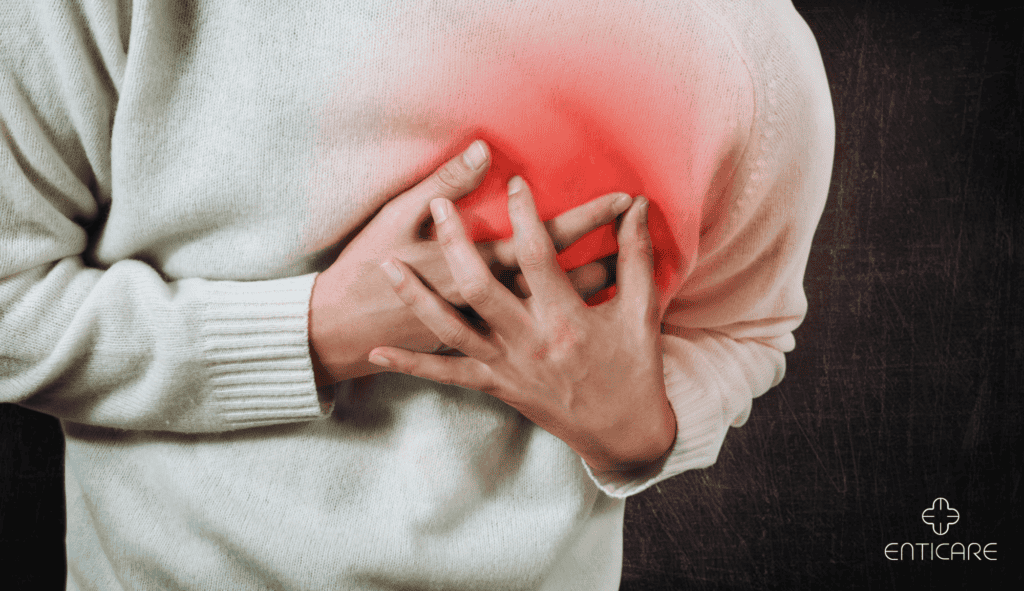Sleep is essential for overall health, yet many of us don’t get enough of it. Whether due to stress, anxiety, or a busy lifestyle, poor sleep can lead to a host of health problems—including chest pain. But are chest pain and lack of sleep really related? The connection between sleep and cardiovascular health is well-established, and understanding this link could be vital to preventing serious health issues.
Recognizing sleep apnea symptoms, such as morning headaches, chronic snoring, dry mouth, and chest pain, is crucial for timely diagnosis and treatment. If you notice these symptoms, consult a physician.
In this comprehensive guide, we’ll explore whether lack of sleep contributes to chest pain, the physiological reasons behind this connection, and what you can do to protect your heart and improve your sleep.

How Lack of Sleep Affects Your Heart
Lack of sleep doesn’t just leave you feeling tired—it can have serious consequences for your cardiovascular system. Multiple studies have shown a direct link between poor sleep and heart health, increasing the risk of heart disease, hypertension, and more. Untreated sleep deprivation can also increase the risk of heart failure. Addressing sleep apnea treatment is crucial in mitigating the cardiovascular risks associated with sleep deprivation.
Increased Risk of Heart Disease
Sleep plays a vital role in regulating heart function and blood pressure. When you don’t get enough rest, your body produces more stress hormones like cortisol, which increases blood pressure and affects oxygen levels, placing extra strain on your heart. Over time, this can elevate your risk of developing heart disease, including coronary artery disease.
Hypertension and Lack of Sleep
Sleep quality also contributes to high blood pressure (hypertension). Various risk factors, such as being overweight, diabetic, or having asthma, can increase the likelihood of developing hypertension due to poor sleep. When you sleep, your heart rate and blood pressure naturally drop, allowing your cardiovascular system to rest. Without adequate sleep, these numbers remain elevated, which can cause lasting damage to blood vessels and increase your risk of stroke or heart attack.
Heart Palpitations and Chest Pain
Sleep deprivation can lead to symptoms like heart palpitations, which can feel like your heart is skipping beats or beating too hard. These palpitations can be a source of chest pain, especially if they occur frequently or for long periods. The physiological demands placed on the chest muscles during episodes of sleep deprivation can cause these muscles to work harder, potentially leading to chest pain. Identifying the causes of chest pain related to sleep deprivation can be crucial, and a sleep apnea diagnosis can play a significant role in this process.
Stress, Anxiety, and Sleep: A Vicious Cycle
Stress and anxiety are often at the root of both poor sleep and chest pain. They feed off one another, creating a cycle that’s hard to break. For sleep apnea patients, stress and anxiety can exacerbate sleep apnea symptoms, leading to further sleep disturbances and health complications. Implementing good sleep hygiene practices is crucial in breaking this cycle and improving overall sleep quality.
How Stress Affects Sleep Quality
When stress levels rise, the body enters a state of heightened alertness, which makes it harder to fall asleep and stay asleep. Racing thoughts, tension, and irritability can all prevent you from getting restful sleep, exacerbating both mental and physical health issues. Additionally, an inadequate sleep environment can further hinder your ability to achieve restful sleep.
Anxiety and Chest Pain
Many people with anxiety experience chest pain as a physical symptom. Anxiety can disrupt sleep patterns, causing muscle tension, rapid breathing, and increased heart rate, all of which may result in discomfort or pain in the chest. The sensation of chest pain can, in turn, cause more anxiety, perpetuating a cycle of worry and discomfort.
The Role of Sleep in Reducing Anxiety
Improving sleep quality can significantly reduce stress and anxiety levels. When you get enough rest, your body and brain have the time they need to recover, regulate stress hormones, and improve overall mental clarity. Better sleep can break the cycle of anxiety and chest pain. Additionally, sleep therapy can be highly effective in improving sleep quality and reducing anxiety.
Sleep Disorders and Their Link to Chest Pain
Several sleep disorders can directly contribute to chest pain, as well as other cardiovascular issues. Identifying and treating these conditions can help alleviate both the sleep problems and the chest pain they cause. Untreated severe sleep apnea can lead to significant health risks, including increased likelihood of accidents and higher mortality rates. Sleep apnea screening is crucial in identifying sleep disorders that contribute to chest pain.
Obstructive Sleep Apnea (OSA)
Obstructive Sleep Apnea is one of the most common sleep disorders associated with chest pain. OSA causes interruptions in breathing during sleep, which reduces oxygen saturation levels in the blood. This lack of oxygen forces the heart to work harder, increasing the likelihood of experiencing chest pain, palpitations, or even heart attack. Continuous Positive Airway Pressure (CPAP) is a standard treatment for obstructive sleep apnea that helps prevent airway collapse during sleep.
Insomnia and Cardiovascular Stress
Insomnia, or the inability to fall or stay asleep, can also lead to chest pain. Chronic insomnia causes constant cardiovascular stress and reduces sleep efficiency, as the heart never gets the full rest it needs. As a result, people with insomnia are more likely to experience heart-related chest pain and are at a higher risk for heart disease. Diagnosing sleep disorders like insomnia through a sleep study, which assesses various physiological parameters to determine the severity of the condition, is crucial for effective treatment and management.
Restless Leg Syndrome (RLS)
Restless Leg Syndrome (RLS) is another sleep disorder that affects cardiovascular health. Though RLS primarily involves uncomfortable sensations in the legs, it also disrupts sleep architecture and sleep quality. Individuals with RLS may experience increased heart rate and blood pressure during the night, which can contribute to chest discomfort.
The Importance of Sleep for Heart Health
The connection between sleep duration and heart health cannot be overstated. Sleep is crucial for keeping your heart functioning properly, and getting enough rest plays a major role in preventing cardiovascular problems.
The Sleep Cycle and Heart Recovery
During the deep sleep stages, the heart rate slows, and blood pressure drops, giving your cardiovascular system time to recover from the day’s stress. This rest period helps repair any damage done to blood vessels and regulates inflammation in the body, which protects the heart from long-term damage.
Reducing Inflammation Through Sleep
Chronic sleep deprivation effects lead to higher levels of inflammation in the body. Inflammation plays a significant role in the development of heart disease, as it can damage blood vessels and lead to plaque buildup. Regular, high-quality sleep reduces inflammation and lowers the risk of cardiovascular problems.
Managing Stress with Sleep
Sleep is a powerful tool for managing stress, offering numerous sleep benefits that support heart health. By prioritizing restful sleep, you can help regulate stress hormones, reduce anxiety, and protect your heart from unnecessary strain.

How to Improve Sleep and Prevent Chest Pain
Understanding the relationship between chest pain and sleep can help you take steps to improve both. By prioritizing healthy sleep habits and addressing any underlying conditions, you can reduce the likelihood of experiencing chest pain. Implementing effective sleep strategies is crucial in improving sleep quality and preventing chest pain.
Establishing a Sleep Routine
Creating a consistent sleep schedule helps train your body to fall asleep and wake up at the same time each day. This routine stabilizes your circadian rhythm, making it easier to get the restorative sleep your heart needs.
Managing Stress Before Bed
To prevent stress from interfering with sleep, establish a relaxing bedtime routine that incorporates effective sleep techniques. Techniques like deep breathing, meditation, or progressive muscle relaxation can help calm your mind and body, making it easier to fall asleep and stay asleep.
When to See a Doctor
If you consistently experience chest pain, especially in combination with sleep disturbances, it’s important to see a doctor. Chest pain can signal a variety of health issues, including serious cardiovascular conditions, and should never be ignored.
Additionally, a sleep consultation can be crucial for addressing persistent chest pain and sleep disturbances.
Take Control of Your Sleep and Heart Health Today
The relationship between chest pain and lack of sleep is clear: poor sleep can exacerbate or even cause chest discomfort, while conditions like sleep apnea can put added strain on your heart. Understanding these connections empowers you to take steps toward better health and sleep improvement.
If you’ve been struggling with chest pain or poor sleep, don’t wait—schedule a consultation with a sleep specialist today. Addressing these issues now can protect your heart and improve your overall quality of life.
Click here to schedule your appointment and start your journey to better sleep and heart health.

